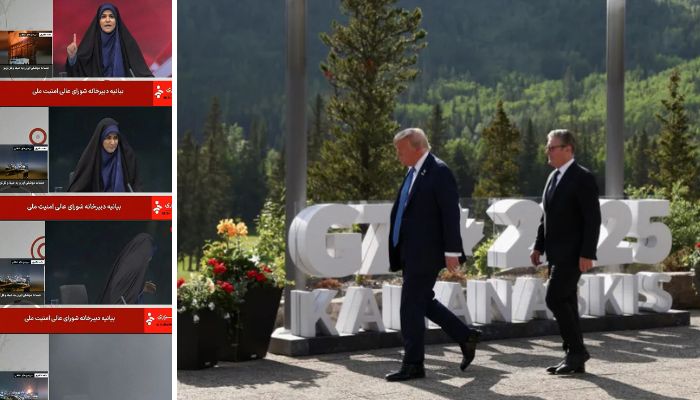
Israeli attack on Iranian state television during live broadcast (Left). US President Donald Trump and UK Prime Minister Keir Starmer at the G7 summit
June 2025: A Dangerous Moment
Missiles are flying between Israel and Iran. Cities are shaking. People are dying. But many powerful countries are just watching, not helping. They say they want “peace,” but their actions tell a different story.
This war is not just about these two countries. It shows us a much bigger problem: unfair treatment, political games, and a world where rules apply to some countries—but not to others.
One-Sided Pressure: Why Only Iran Gets Blamed
Many global leaders say Iran must stop its nuclear plans. But no one talks about Israel’s nuclear weapons—even though most experts believe Israel has them.
Iran joined the Nuclear Non-Proliferation Treaty (NPT).
Israel never did. But no one punishes Israel.
The International Atomic Energy Agency (IAEA) checks Iran often, but it never checks Israel.
This is called a double standard—when one country is punished, and another is protected for doing the same thing. This makes the Middle East more dangerous, not safer.

What’s Happening Now: Real Facts from the War
In June 2025, the situation became worse:
Israel launched strong military attacks deep inside Iran.
Iran responded with missile strikes, but they caused less damage.
Still, many news reports called Iran the “aggressor”.
One article said it was a “moment of truth” for Israeli Prime Minister Netanyahu, while calling Iran’s response “risky but low-impact.” (AP News).
This kind of biased reporting shapes how people and politicians think. And it helps powerful countries avoid responsibility.
Why Iran Cannot Fight Back Strongly
Iran is struggling. It has:
Old weapons and weak air defenses.
A bad economy because of long U.S. and European sanctions.
No strong military allies willing to help.
Over 300 people were killed in Iranian cities. But if the war continues, Iran could collapse—like Gaza, but on a much larger scale.
Why Is Netanyahu Fighting Now?
Prime Minister Netanyahu is in political trouble at home. There are:
Protests against him.
Accusations of corruption.
Some say he is using this war to stay in power. In a recent Fox News interview, he said Iran tried to kill former U.S. President Donald Trump and called himself Trump’s “junior partner.”
These words may be trying to drag the U.S. into the war—which would make things even worse.
Will the U.S. Join the Fight?
The U.S. is a key player. Right now, it is watching carefully. But if more attacks or provocations happen, the U.S. might join the war. That could turn a regional conflict into a global disaster.
Where Are Russia, China, and Turkey?
These countries say they support peace and criticize the West. But:
Russia sees Iran as a tool to weaken the U.S.
China wants Iran’s oil for its Belt and Road project.
Turkey says little, focused on its own interests.
None of them are stopping Israel. None are helping Iran in a meaningful way. They are protecting their own political and economic goals.
The Role of Muslim Countries and the OIC

The Organization of Islamic Cooperation (OIC) says the region should be free of nuclear weapons. But many Muslim countries are divided.
Some like Saudi Arabia, the UAE, and Bahrain now work closely with Israel.
They are also afraid of Iran’s power.
When Israel bombed Iran’s consulate in Syria, most Muslim countries said little or nothing.
Why? Because of money, deals, and fear of the U.S. The result is that the Muslim world is too weak and too divided to protect its own region.
The Collapse of International Law
This war shows that global rules are broken.
The UN is slow and powerless. Big countries block action with vetoes.
The IAEA checks Iran but ignores Israel.
Civilians are dying, and war crimes are possible—but no one is punished.
If the law is used only against weaker nations, it is no longer real law. It is just power wearing a mask.
What If Iran Uses Nuclear Weapons?
This is the worst-case scenario. If Iran feels trapped, it might think about using a nuclear weapon.
This would bring huge destruction.
It would cause a global nuclear crisis.
Or, Iran may just get destroyed—“like Gaza,” but on a national scale.
No one wants this. But as long as no country stops the war or treats Iran fairly, this risk becomes more real.
What Should the World Do Now?
Time is running out. But there are still things the world can do:
The United Nations must push again for a nuclear-free Middle East—a goal first discussed in 1974.
Russia, China, and Turkey must move from words to real peace talks.
Muslim countries and the OIC must act with unity and courage, even if it upsets powerful allies.
The West, especially the U.S., must stop showing favoritism. It must treat Israel and Iran equally.
Peace Needs Truth and Fairness
Peace is not built with missiles. Peace is built with honesty and justice. If the world says “Iran must follow the law” but lets Israel break it, that’s not peace—it’s hypocrisy. If powerful countries stay silent while innocent people die, that is not neutrality—that is permission for war. The world must act not to support one side, but to bring balance, fairness, and a safer future for everyone. If we wait too long, the next missile may not just hit a city. It may start a global war.

Editor & Publisher
Dulal Ahmed Chowdhury
www.newsdiplomats.com
The News Diplomats
Cell: +1 (437) 365-4003 & +1 (647) 709-3389
Email: [email protected]
Toronto, Canada.
©২০২৩ সর্বস্বত্ব সংরক্ষিত || The News Diplomats